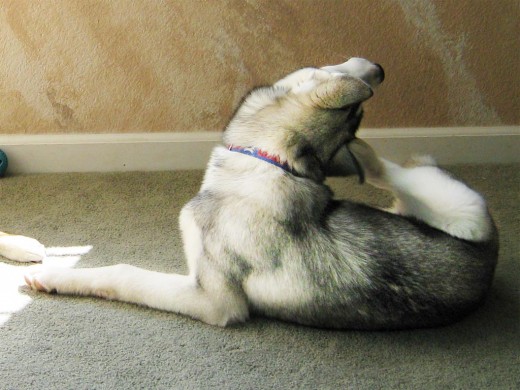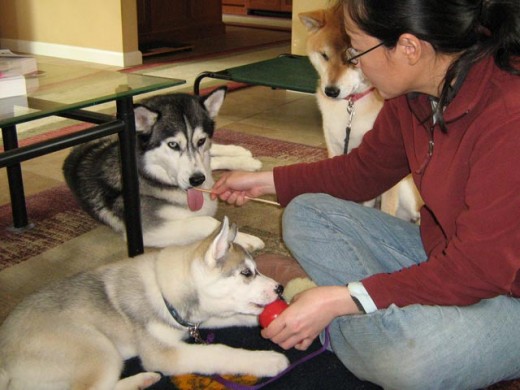Occasional itching and scratching is natural dog behavior. Problems only arise, when our dog starts to itch and scratch with extreme frequency.
Common reasons for extreme dog itchiness include-
- Allergies,
- Bacterial infection, or
- Skin parasites.
The irritation may sometimes cause our dog to rub his nose and body on the rug, on furniture, or even in the mud and snow. These behaviors may offer him some temporary relief, but it may also cause dirt to enter the wound, and further inflame the condition of his skin.
Depending on the cause of dog itchy skin, there could also be hair-loss.

1. Hot Spots
As I understand it, hot spots are caused by bacterial infection on the dog’s skin. It usually starts when a scratch or opening on the skin is exposed to moisture, for a prolonged period of time.
My Husky developed a hot spot last winter, on the lower-inner part, of her back leg. It was raining frequently, and she probably developed the skin infection from exposing a scratch on her leg to water, or from lying on a damp surface. Being a Siberian Husky, Shania likes being outside in the rain. However, we now limit her rain time and make sure to dry her well when she comes in.

With hot spots, it is important to catch it as early as possible. Otherwise, the condition may worsen and spread, when the dog continuously licks or scratches on the infected site. If untreated, the infected area may become painful, may develop pus, and may start to smell.
Luckily, we caught Shania’s hot spot early-on and stopped it, before it was able to expand. We cut away the fur around the spot, and kept the area dry. The most challenging part was supervising my dog, and making sure that she did not lick or bite at the inflamed skin. Sometimes, an Elizabethan collar may be necessary to prevent licking, scratching, and biting.
After a trip outside, we gently toweled-down the area, and then lightly fanned it, until it was no longer wet. Keeping it free of moisture reduced irritation to the skin, which in turn, made it less likely for my dog to continue worrying at it.
If the infection spreads or develops pus, it is best to get treatment from a vet.

2. Food Allergies
With food allergies, the itching and scratching is usually accompanied by loose or watery stool. My Shiba Inu is allergic to wheat, and he used to get really itchy from it.
To identify the source of the allergy, I started feeding my dog really plain meals (boiled chicken and rice); no treats or other types of food. I was also very careful during neighborhood walks, so that he did not slip in a “road-side surprise“.
It may take a few days before the allergens clear out of our dog’s system, and we start to see an improvement. Some dogs may be allergic to poultry, so if the boiled chicken does not help, then switch to an alternate meat source, for example venison or rabbit.

I only boil or microwave the meat. Do not add anything else, and absolutely do not use table scraps. Table scraps are usually too rich for dogs, and may contain spices or ingredients (e.g. onions) that are poisonous to dogs. Some dogs may be allergic to multiple common ingredients. My Siberian Husky, for example, is allergic to wheat, oats, and some types of fish.
Once the extreme itching goes away, slowly introduce our dog’s normal food back into his diet, one by one, until we find the problem ingredient.
I start with only 1/4 portion of the first food. If everything goes well, I slowly increase the portion by quarters, after every few days (three or more). If the allergy symptoms do not come back after a couple of weeks, I introduce the next food on my list and so on.
If we are using dry food (kibble), find one that is grain free, and has good protein sources. Some good kibble brands include Orijen, Blue Wilderness,
Nature’s Variety Instinct
, and Wellness CORE.

3. Environmental Allergies
Dog itching can also be caused by plants, pollen, or other chemicals.
The best way to deal with environmental allergies, is to keep our dog away from the offending chemicals or contaminants. For example, my dogs often stick their muzzle into holes, bushes, and plants. Therefore, if I suspect outdoor allergens, I try keeping them mostly inside the house for a few days. At the same time, I limit and closely supervise their outside time.
If the itching improves, then my dog is likely allergic to something in the backyard or neighborhood. Once I identify which plant is the source of the problem, I remove it from my backyard and avoid it during walks.
Note that some plants can be poisonous to dogs.
Like us, dogs may also have a reaction to inhaling certain air allergens such as pollen or mold. However, symptoms usually include nose irritation and frequent sneezing.

4. Skin Parasites


Dog itching may also result from mites, fleas, or other skin parasites. Some flea and tick prevention products.
Our vet can easily diagnose this with a skin scraping. Depending on the parasite and the severity of the infection, different treatments may be appropriate. Ask our vet for the pros and cons of each.
Note that many parasite treatments involve the use of toxic chemicals to kill the mites or fleas.
Some dogs may have a bad reaction to these toxins. Therefore, I ask my vet about possible risks, as well as supervision and after-care requirements. I also get additional information from online sources to fill in the gaps, and provide a more comprehensive picture of available options. If I am still unsure about safety, I get a second professional opinion.
My Husky recently got demodectic mange from her puppy playmates in dog daycare. To treat the skin mites, our vet suggested the use of Goodwinol ointment. This treatment got the mites under control after about one week, but it also caused some vomiting and irritation to the eyes.
There are also some horror stories on flea and tick repellent products. This article has some good information on possible risks.
Since these repellents are designed to kill fleas, ticks, and other skin parasites, they are all toxic to some degree. As such, there is always the possibility that our dog may have a bad reaction.
Flea and tick collars can be especially dangerous because if they are not properly fastened, a dog may chew off pieces, or even swallow it whole.
However, not using flea and tick repellents may expose our dog to skin irritation, as well as dangerous diseases such as lyme disease. Before making a decision, it may be useful to read what the FDA has to say about fighting fleas and ticks.

If we find ticks on our dog, do not try to pull them off with our fingers. This may cause the body of the tick to break off, and leave the head still embedded in our dog’s skin. Embedded tick parts may sometimes cause a skin infection.
One of the best tools for removing ticks easily and safely, is with the Ticked off tick remover.
It may look just like a silly plastic spoon, but it works surprisingly well. Since I got it, I have been able to remove all ticks from my dogs without any problems.
Conclusion
Finally, dogs may also lick themselves as a result of stress, nervousness, or anxiety (e.g. separation anxiety). In these situations, a dog may engage in displacement behaviors such as self grooming, to calm himself down. Over-grooming can cause irritation to the skin and hair loss.
In general, we want to address skin irritation issues as soon as possible. Otherwise, our dog will likely keep licking and scratching at the problem area, and worsen its condition. Excessive licking may cause pain and further irritate the skin, which will encourage even more licking, and so on. If not addressed, this may be habit forming, and lead to Acral Lick Dermatitis.
These are the most common reasons for dog itching, dog scratching, and hair loss. However, there could be other causes, so it is always best to consult with a vet.
When dealing with allergy issues, find a vet who is willing to help us identify the source of the problem. Medication may help in the short term, but for a long term solution, we want to pinpoint the origin of our dog’s allergy, and stop it there.
In this article, we only focus on itchy dog skin. For a broader, more general discussion of dog allergies, check out Allergies and Atopy in Dogs. Dogs may also have allergic reactions to their yearly vaccination shots. This article on Vaccine Side Effects and Risks gives a good overview of possible dangers.


Hello,
I have a shiba and also has an itchy skin. He is biting his front legs constantly and scratching his face. He is scared outside when the weather is too humid. I changed his food because vet said Apollo had allergies to chicken.
I am offering only food made of fish but lately he is not eating. He wants to eat but plays with the kibble and avoids eating. Could be that he is bored with the same food?
My concern is his itching.Apollo is one year old, I do not want give him asteroids. Last summer I gave 2 times a dip with lime sulfur and he improved. Do you think he has mites?
Thanks,
Serios
Don’t know if anyone is still on the site. Lucky is nearly 10 years old, and is suffering from some sort of wild allergy. That is tested him for parasites and he’s come up clean. They are convinced that it is a food allergy. He is psychotically licking constantly the floor, his bed, himself, his feet, but most of all and the most disturbing is his anus. He has no hair left around his anus. We have changed his food again. For many years we were using Taste of the Wild Buffalo and venison mix because that is what did not make him vomit or itch. Suddenly he is disingenuously driving us all insane with the constant licking. We have changed over to a holistic food which is grain-free. He has been placed on apoquel to try to stay the scratching and licking. Any suggestions?
Hi, I have a 10 year old Chihuahua, she has had her anal glands expressed, steroids and a hydro-cortisone injection but still continues to itch. She constantly scratches under her belly and its driving her mad, the vets wants to do an allergy test which I’m ok with but hope they find something as the poor girl is getting stressed, does anyone have any ideas?
Try swapping her to a raw diet, bathe her regularly in colloidal oatmeal shampoo (once or twice a week), put coconut oil in her food and rub on her skin as well. See if the itching dies down, also give antihistamines like Piriton to help the itching. There are many good articles on the internet about safe antihistamines and dosage for dogs.
ABADY granular food. Hard to find in stores but you can order online.
Dear Shibashake,
I have two huskies, Tsubaki. and Tsukira, Tsubaki just turned four and is experiencing extreme itching which started with an ear infection but is now completely out of control…..I took her to the vet as soon as I saw the ear infection but I live in a small town and am a single mom with extremely limited income, we resolved the ear but afterwards came the itching, licking, biting and I took her back to the vet and she said after scraping, that it was a fungus. This costs me over 450. and my baby is worse than ever. I have her in a cone collar but she is determined to continue biting and chewing. It is all over now…tail. back, three paws, stomach, I cry all the time, please help us!
This is pretty serious.. I hope your fur babies are okay !
Wash you dog down with apple cider vinegar dilution. and use it topically. Change your dogs diet to raw, take out all processed foods, give your dog antihistamines, use otodex for ear infections. Also you can buy canker powder from amazon, a tiny bit rubbed into the ear flaps and on the skin goes a long way. The apple cider vinegar stops all itching, i am using it currently on one of my foster dogs.
Thank you so much for your very informative site!
I also love the pics of your fur babies!
Thank you! Much appreciated. 😀
I just wanted to share my experience as I scoured sites like this for possible solutions. I have a 4 year old shiba who suddenly started scratching her muzzle, causing hair loss, whisker loss and ooziness/wounds. It would get better and then worse. We took her in for a skin test by the vet and that was clear. Just before we were going to start testing her diet the vet suggested switching our ceramic dog bowls for stainless steel. Apparently cats are commonly irritated by ceramic and we all know how cat like shibas are. It worked!!! It has been a couple months now and I was the stainless steel bowls regularly and her hair is back, whiskers grown back and no more scratching.
Thanks for posting this Sarah. Good to know.
Hi shibashake,
Thank you for sharing your experience with us. I have a 4-month old husky boy. I feed him Wellness Core grain-free kibbles. I usually mix the kibble and web food for him in the morning and at night since he loves it so much. Recently, when I refilled his can food, I accidentally purchased the wrong one — bought Wellness can food for puppy instead of the Core grain-free can food for dog and puppy which my husky pup consumes regularly. So now he’s been having really bad diarrhea since Sunday (when he started the Wellness can food).
I am thinking of to give him plain broiled chicken and rice to him for now until his stomach gets better. But for doing so, can I stop his kibble and wet food completely at once and start the plain home made food right away.. or should I introduce him to the plain home made food gradually in a few days.
Please advise.
Thank you so much in advance!
I have a 5 month old, female siberian husky. She had been itching way too much so I took her to my vet. He told me that because her anal glands were blocked that why it caused the skin allergy to occur from the back, spreading to the tail and her hind legs and also on her back. Also she kept scratching her face and ears which led to hair loss from those particular area. He prescribed a spray to be used and I have been using it too. But I do not see much of a result of it because she continues scratching her ears and face and also, biting her tail, back, legs and paws. What should I do now?
Is this your regular vet whom you trust?
If my dog continues to have health issues, then I can continue to consult with my trusted vet to try and identify the true cause of the problems. Alternatively, I get a second opinion from a highly rated vet by looking at reviews from trusted sources, e.g. consumer reports.
Yes, I consulted another vet about whom, one of my friends told. Heide is fine now. She does not itch a lot now. The vet has told that the itching will get better really soon. Thanks a lot for your help, btw. 🙂
Ask your vet about zinc deficiency huskies are prone to it.